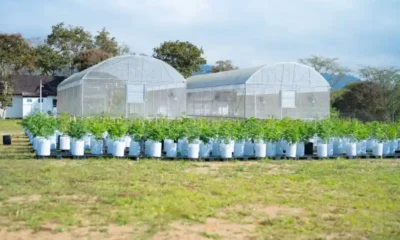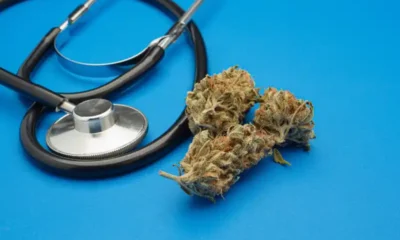Connect with us
Published
2 years agoon

We’re collectively learning more and more about cannabis as research continues and legal markets continue to grow, and it looks as though we may have more control over the cannabis plant’s cannabinoid content than we once thought. A new report shows that researchers at the lab of Professor Alexander (Sasha) Vainstein in Rehovot, Israel have engineered medical cannabis strains with 20% more THC, first reported by The Jerusalem Post.
This breakthrough was made possible through financial support and partnerships with Mariana Bioscience Ltd. and could help to create new strains and boost crop yields in the future.
The work of Bulgarian-born Professor Raphael Mechoulam, a still-active organic chemist and professor of medicinal chemistry who has studied cannabis for more than five decades, set the foundation for this research, when he and his team successfully synthesized THC back in 1976. Mechoulam and his team also successfully synthesized CBD and CBG.
Now, a younger generation of researchers continues this conversation, having successfully increased the level of THC by almost 17% and the level of CBG by close to 25%. Vainstein and his team were also able to increase the ratio of terpenes by 20-30%.
The team stated that their goal in this study was to find a way to intervene in the biochemical pathways in the cannabis plant to increase or decrease the production of active substances. To explore this possibility, researchers manipulated a neutralized plant-based virus, so it wouldn’t cause harm to the plant, to express the genes that influence the production of active substances within the cannabis plant.
Vainstein told The Jerusalem Post that this work represents the “innovative use of these tools,” constructed using synthetic biology tools.
“Next, we developed an innovative technology based on infection with an engineered virus to facilitate chemical reactions that increase the quantities of desired substances,” Vainstein said. “In collaboration with Mariana Bioscience Ltd., we examined the infected plants and found that the levels of the substances in question had indeed risen.”
This is also the first time that researchers have successfully performed this feat with the cannabis plant. Vainstein added these findings will be valuable both to the cannabis industry as a whole but also to medical researchers looking to develop strains that help medicinal users to treat specific conditions. He also said that more extensive experiments surrounding engineered cannabis plants are currently in process, with plans to reveal those findings to industry leaders and researchers in the coming months.
Citing the work of Professor Mechoulam and this new study, The Jerusalem Post argues that the Hebrew University of Jerusalem can justifiably boast that “it has done more for cannabis research than any other scientific institution in the world.”
The country is also in the midst of shifting its own industry. Back in March, it was reported that the Israeli government is considering decriminalizing recreational cannabis use and expunging the criminal records of those convicted of personal possession of or use of cannabis, according to President Isaac Herzog and Justice Minister Gideon Sa’ar.
The country’s medical cannabis market is already booming, with medical cannabis consumption growing from 28.5 million tons in 2020 to 43 metric metric tons in 2021.
Earlier in May, the country also signaled that it is looking to expand into the global cannabis industry. A statement from the Israeli Agriculture Ministry said Israel was making its first-ever export of cannabis seeds to the United States.
“The export of cannabis seeds has long expanded the range of Israeli agricultural exports and strengthens local agriculture, while taking advantage of Israel’s relative advantage in a field that is still considered primitive. We must support Israeli companies as they take their first steps in the global market,” Oded Forer, minister of agriculture and rural development, said in the release.
With the new findings around cannabinoid synthesis, it appears that the country is looking to secure its spot in the budding global cannabis industry from all angles, but we’ll have to wait and see what the additional findings reveal and how they could alter the larger, global cannabis industry.


Carmelo Anthony Launches Cannabis Brand


Santa Barbara County Approves Study To Address Ongoing Cannabis Odor


Kansas Medical Cannabis Proposal Dead for 2024


Psychedelic Research Proves Rather Tricky for the FDA


Psychedelic Drug Market Poised to Hit $4.6B by 2030


Chronic Pot Use Has Minimal Effect on Motivation, Study Shows
